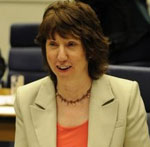 AFP: European Union foreign policy chief Catherine Ashton on Wednesday said she hoped Iran would show some “flexibility” at upcoming talks with world powers on its nuclear program in Kazakhstan.
AFP: European Union foreign policy chief Catherine Ashton on Wednesday said she hoped Iran would show some “flexibility” at upcoming talks with world powers on its nuclear program in Kazakhstan.  UNITED NATIONS (AFP) — European Union foreign policy chief Catherine Ashton on Wednesday said she hoped Iran would show some “flexibility” at upcoming talks with world powers on its nuclear program in Kazakhstan.
UNITED NATIONS (AFP) — European Union foreign policy chief Catherine Ashton on Wednesday said she hoped Iran would show some “flexibility” at upcoming talks with world powers on its nuclear program in Kazakhstan.
Iran and the so-called P5+1 — Britain, China, France, Russia, the United States and Germany — are due to resume discussions in Almaty on February 26, after a months-long break and failed meetings in Istanbul, Baghdad and Moscow.
“We hope that Iran will come to these negotiations with flexibility, and that we can make substantial progress,” Ashton, who is leading the negotiations for the P5+1 group, told the Security Council.
“We remain determined to work towards a solution to the Iran nuclear issue based on the dual-track approach,” combining sanctions and dialogue, she said.
“There is no doubt that the pressure of sanctions has been instrumental in bringing Iran back to the negotiating table but sanctions cannot be an end in themselves,” she added.
“The key is for Iran to comply fully with its international obligations.”
The West and Israel suspect Tehran is seeking to develop nuclear weapons under the guise of what the Islamic republic insists is a purely civilian program with peaceful ends.
Iran has seen its economy nosedive weighed down by four rounds of biting UN sanctions, and backed by separate measures imposed by the United States and the EU, designed to choke off revenue from its oil wealth.
Britain said last week that world powers would make an “updated and credible” offer to Iran at the Almaty talks.
“The onus is firmly on Iran to come to the next talks ready to negotiate seriously, and to take concrete steps to respond to international concerns over its nuclear program,” said Philip Parham, Britain’s deputy permanent representative to the United Nations.
French Ambassador Gerard Araud said he expected Tehran to make gestures to build trust. But he warned, “As long as Iran does not meet its obligations, we will step up the pressure in order to convince it to abandon its policy of isolation and provocation.”
The talks aim to address a key Western concern about Iran’s capacity to enrich uranium to fissile purities of 20 percent, a process that can be used for peaceful atomic purposes as well as for making the core of a nuclear bomb.
Iran’s mission to the United Nations said Iran expects the other side to be “serious and forthcoming” for there to be “positive and fruitful results.”
“The dual track approach currently pursued by a number of countries is a futile exercise in the sense that the track (of) exerting pressure on Iran will derail the efforts on the diplomatic track,” it said.
On Wednesday, Iran announced an upgrade to its uranium enrichment machines, despite a warning from Washington that such a move would violate UN resolutions.


